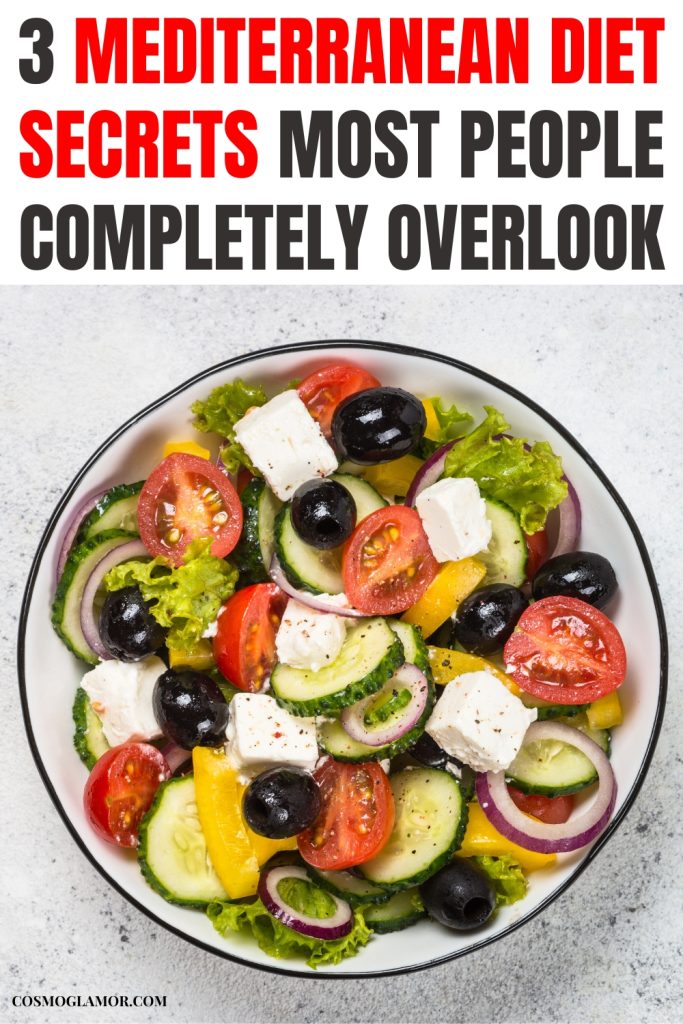The first time I really got the Mediterranean diet, it wasn't in some fancy restaurant or reading a scientific study (though those are important!). Nope. It was in my tiny kitchen, surrounded by overflowing bowls of… well, everything. I was trying, and failing spectacularly, to recreate my Yiayia's (that's Greek for Grandma) legendary horta vrasta – boiled greens. Simple, right? Wrong. So, so wrong.
It turns out, there's a lot more to this whole “Mediterranean Diet” thing than just drizzling olive oil on everything and calling it a day. (Though, let's be real, good olive oil does make almost everything better.) I’ve learned that the real magic lies in the details, the stuff most people miss. And believe me, I’ve missed plenty.
So, what are these elusive secrets? Why does following the Mediterranean diet sometimes feel like you're trying to solve a delicious, ancient riddle? Let's dig in.
Secret #1: It's a Plant-Based Party, Not Just a Salad

Okay, we all know vegetables are important. But the Mediterranean diet takes this to a whole new level. It's not just about a sad side salad next to a giant steak. It’s about a symphony of plant-based goodness. Think vibrant colors, textures that range from crunchy to creamy, and flavors that… well, they explode in your mouth.
And it's not just fruits and veggies. We're talking about a full orchestra of plant-based foods:
- Whole Grains Galore: Forget that fluffy white bread (sorry!). We’re diving into hearty whole-wheat loaves, nutty brown rice, chewy barley, and even ancient grains like farro. These guys are packed with fiber, which, let me tell you, your gut will thank you for. Fiber not only keeps things… moving, promoting healthy digestion, but it also contributes to feelings of fullness, so you're less likely to reach for that second (or third) donut. Studies show that a high intake of whole grains is associated with a reduced risk of heart disease, type 2 diabetes, and certain cancers.
- Legumes: The Unsung Heroes: Beans, lentils, chickpeas… these are the real MVPs of the Mediterranean diet. My Yiayia could make a feast out of a handful of lentils and some spices. They're cheap, filling, packed with protein, and surprisingly versatile. I used to think beans were boring. Then I discovered Gigantes Plaki (giant baked beans in tomato sauce), and my life changed forever. Seriously, look it up. Legumes are also fantastic for your gut microbiome, providing the prebiotic fiber that beneficial bacteria thrive on.
- Nuts & Seeds: Tiny Powerhouses: A handful of almonds, walnuts, or even some sunflower seeds can do wonders. Healthy fats? Check. Fiber? Check. That satisfying crunch? Double check. Just don't go overboard – they are calorie-dense. (I learned that lesson after polishing off a whole bag of pistachios while watching Netflix. Whoops.) Nuts and seeds are also rich in phytonutrients, unique plant compounds with antioxidant and anti-inflammatory effects.
The point is diversity. It's not just about eating more plants; it's about eating a wider variety of them. Each one brings its own unique set of nutrients and flavors to the table. Think of it like building a super-team of nutritional superheroes. This diversity is crucial because different colored plants contain different phytonutrients, each with its own health benefits. A rainbow on your plate means a wider range of protective compounds working for you.
Secret #2: Spice It Up, Baby! (And Ditch the Salt Shaker… Mostly)

This is where things get really interesting. My biggest mistake early on? Bland food. I thought “healthy” meant “flavorless.” Oh, how wrong I was.
The Mediterranean diet is a flavor explosion, and a lot of that comes down to the generous use of herbs and spices. We're not just talking a sprinkle of dried oregano here. We're talking about a vibrant tapestry of flavors:
- Fresh Herbs: Basil, mint, parsley, dill, rosemary… the list goes on. Fresh herbs are like little flavor bombs, adding brightness and complexity to even the simplest dishes. I used to kill every herb I touched. Now? I have a small herb garden on my windowsill. (Okay, “thriving” might be pushing it… the basil is looking a bit delicate.)
- Dried Spices: Cumin, coriander, turmeric, cinnamon, paprika… these aren't just for exotic dishes. They're everyday staples in Mediterranean cooking. And they don't just taste good – they're good for you! Many of these spices have potent antioxidant and anti-inflammatory properties. Turmeric’s anti-inflammatory properties, for instance, are backed by research, like a 2017 study in Foods journal showing its curcumin compound reduces oxidative stress. Cinnamon has been linked to improved blood sugar control (Journal of the Academy of Nutrition and Dietetics, 2016).
- Garlic and Onions: I mean, come on. These are the foundation of flavor in so many Mediterranean dishes. Don't be shy!
And don't forget acid! A squeeze of lemon brightens dishes while reducing the need for salt, adding vibrance, and aiding digestion.
The beauty of all these herbs and spices? They let you cut back on the salt. Seriously, try roasting vegetables with just olive oil, garlic, herbs, and a squeeze of lemon juice. You won't miss the salt. Your blood pressure will thank you, too.
Quick Recipe: Yiayia's Horta Vrasa (Simplified)
- Boil a big pot of water.
- Add a generous bunch of greens (dandelion, chicory, spinach, or a mix).
- Cook until tender (about 10-15 minutes).
- Drain well.
- Toss with plenty of extra virgin olive oil, fresh lemon juice, minced garlic, and a pinch of salt (optional).
Starter Spice Blend: Mix equal parts dried oregano, cumin, and paprika. Use it on roasted vegetables, grilled chicken, or fish.
Secret #3: It's Not Just What You Eat, It's How You Eat

This is the one I struggled with the most, and it's arguably the most important. The Mediterranean diet isn't just a diet; it's a lifestyle. And a big part of that lifestyle is about how you eat, not just what you eat. But flavor isn’t just about spices—it’s also about how you savor your meals, and this brings us to the next “secret”.
- Slow Down: Seriously, put down your phone, turn off the TV, and savor your food. Chew slowly. Appreciate the flavors and textures. This isn't a race! Eating slowly helps you feel fuller and more satisfied, and it's just… more enjoyable. Studies have shown that mindful eating can help with weight management and reduce digestive issues.
- Eat with Others: This is a big one. In Mediterranean cultures, meals are often a social event. They're a time to connect with family and friends, to share stories, and to laugh. Food is something of enjoyment, not just fuel. I know it's not always easy to gather the whole family for a leisurely dinner every night. But even just sharing a meal with one other person, or even just sitting down at the table instead of eating in front of the TV, can make a difference. Research indicates that social eating is linked to improved mental well-being and stronger social connections.
- Move Your Body: The Mediterranean lifestyle is an active lifestyle. It's not about grueling workouts at the gym (though those are fine if you enjoy them!). It's about incorporating movement into your daily routine. Walking, gardening, dancing… find something you enjoy and do it regularly. The combination of a healthy diet and regular physical activity is a powerful one-two punch against chronic disease.
Think about it: have you ever seen a picture of a Greek yiayia hunched over a plate, shoveling food in her face while staring at her phone? Probably not. There's a certain joie de vivre, a zest for life, that's baked into the Mediterranean way of eating (and living).
Meal Prep Tip: Cook a big batch of lentils or brown rice at the beginning of the week. Use them as a base for salads, soups, or side dishes throughout the week. This saves time and makes it easier to stick to healthy eating habits.
The Takeaway (and a Confession)
Look, I'm no expert. I'm still learning, still experimenting, still making mistakes. My first attempt at hummus was… well, let's just say it was texturally challenging.
But that's okay! The Mediterranean diet isn't about perfection. It's about progress. It's about finding a way of eating (and living) that's enjoyable, sustainable, and good for you – body and soul. To recap, it’s about embracing a plant-based abundance, unlocking the power of herbs and spices, and integrating mindful, social eating habits.
So, go ahead, experiment! Try new things. Burn a few dishes. (It's a rite of passage!) Embrace the messiness, the imperfection, the humanity of it all. And most importantly, enjoy the journey.
This Week's Challenge: Replace one salty snack with a handful of spiced nuts, or host a Mediterranean-inspired potluck with friends! Let's celebrate good food, good company, and good health.



![The Top 7 Mediterranean Breakfasts That Aren't Eggs. 1[1]](https://cosmoglamor.com/wp-content/uploads/2025/10/11-150x150.jpg)

